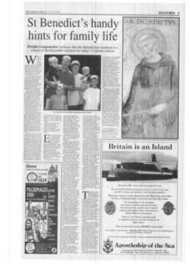Page 12, 15th June 2001
Page 12

Report an error
Noticed an error on this page?If you've noticed an error in this article please click here to report it.
Tags
Share
Related articles
Did Brindley Nod?
Is The Royal Family Really 'protestant' Any More?
Mob Rule And The Ugly Face Of Righteousness
Holding Tight To The Art Of Offering Our Best To God
When In Rome...
Death comes to us all, even to kings it comes
Charterhouse Chronicle Brian Brindley
F, _iveryone must have been horrified by the recent events in the royal palace at Kathmundu: the
brutal murder of the King and Queen of Nepal and most of the royal family, by the Crown Prince, who then killed himself. It is small wonder that this scene reminiscent of Greek tragedy, or of the last act of Hamlet should have left that beautiful but impoverished country bewildered, and the very survival of the monarchy in doubt.
One of the advantages of an hereditary monarchy, constitutional or despotic, is that the succession passes from one generation to the next, naturally, gracefully, and without dispute. The British people were shocked by the sudden death of King George VI, even though he had been seriously ill for some years; but his heir. Princess Elizabeth, had taken black clothes with her on her trip to Africa, and nobody
It would take a mere nine deaths to place the Crown on the brow of Mr Peter Philips, who, although a grandson of the Queen, has not been brought up "royal" in any way.
doubted that she was now Queen. When the time comes (absit omen!) for her to die, we are entitled to expect that her obsequies, and the coronation of her successor, will be re-vitalizing to the spirit of the nation.
It was not always thus. In the time of the Wars of the Roses, king succeeded king often in the most bloody circumstances. And even since then Providence has dealt some cruel blows to the ordered succession. Three times since 1600 the Crown has lighted upon the head of a foreign monarch. The genes of the lustful Henry VIII were singularly unable to perpetuate his line and, after the death without issue of his three children, Edward, Mary, and Elizabeth, the succession passed to James V1, King of Scots, a lookahke of Mr Robin Cook, but a homosexual with nasty personal habits.
A mere 85 years later, Parliament decided to exclude Catholics from the succession, and offered the Crown to another foreign homosexual, William of Orange. The Protestant Stuart line failed within a generation, and there ascended to the throne that particularly unpleasant person George, Elector of Hanover, (a heterosexual of the beastliest kind) who could noteven speak English.
Even since then, things have not gone smoothly for the House of Guelphd'Este, later von Wettin, and more recently Windsor. In 1817 the only granddaughter and heir presumptive of George III died in childbed at the age of 21. The king's ridiculous policy of preventing his
children from marrying resulted in the fact that there was no direct heir at all in the second generation: the Crown would sit briefly on the grizzled heads of 14 elderly and childless princes, until it fell to the 14-year-old King of Wurttemburg. The princes all rushed to marry "for the succession"; the Duke of Kent pensioned off his faithful companion of many years, Mme de Saint Laurent, married a penniless widowed princess and became, happily, the father of Princess Victoria.
Towards the end of her reign, the heir presumptive in the second generation, Prince Albert-Victor, Duke of Clarence and Avondale, died unexpectedly of typhoid on the same day, incidentally, as Cardinal Manning. This was seen at the time as a great disaster; but fortunately he had a much more capable younger brother who, in due course became King George V.
And then, within living memory, came the great blow to the monarchy (as it seemed) of the abdication of Edward VIII in order to marry Mrs Simpson, who was not thought suitable to be Queen. Edward had been the most popular, most adored, Prince of Wales in history; his brother Prince Albert, a reluctant George VI, feared that the whole system would crum ble. With remarkable speed (and largely, no doubt, owing to the qualities of the "good little couple" King George and Queen Elizabeth) the British people decided to forget the glamorous Edward, and to concentrate on the new royal family, especially the young Princess Elizabeth,
lhI is of course quite impossible to imagine anything like the events in Nepal appening within the British royal family. But we live in dangerous times. Just suppose (God forbid!) that some evildisposed persons were to drop a bomb on Sandringham House at Christmas, when the Queen and all her family were gathered together. It would take a mere nine deaths (the same number as in Kathmandu) to place the Crown on the brow of a pleasant young man of 24, Mr Peter Philips, who, although a grandson of the Queen, has not been brought up "royal" in any way. And it would take only twelve deaths for that talented designer and furniture maker David. Lord Linley, to become King.
How should we manage? Well, I trust. In preparing this article, I have traced the royal line to 400 places. Number 100 is the Grand Duchess Marie of Russia, but many of those in the list are quite ordinary people without titles or any other mark of royal blood. 25th and 26th in the line are two young brothers, Cassius and Columbus Taylor. King Columbus 1 is a cheering prospect. I am confident that the succession of any king or queen, however unexpected, and however strangely named, would take place with great dignity in sharp contrast, for example, to the unbecoming scenes that accompany the choice of a new Head of State in the United States. So we should pray for the people of Nepal; and hope that the new king can hold his country together.
blog comments powered by Disqus













